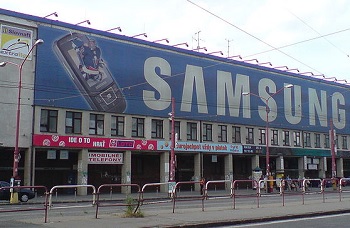Oberthur Technologies will assist in the deployment of Samsung Pay in Europe
Samsung is preparing to launch its own mobile payments platform, called Samsung Pay, later this year and the company has chosen to partner with Oberthur Technologies in order to launch the service in Europe. Oberthur Technologies provides end-to-end service for digital payments and will help deploy Samsung Pay in several European countries. Samsung Pay is set to compete with other mobile payments services that are also expected to be launched in Europe later in the year.
Mobile payments continue to grow among consumers
Samsung Pay is designed to allow people to make purchases from their phones. While this is not a novel feature, the platform can be used in physical stores to make payments, replacing credit cards and cash. The platform makes use of NFC technology, which is capable of transmitting digital information over short distances. With an NFC-enabled mobile device, consumers will be able to use Samsung Pay in stores that have NFC-enabled point-of-sale systems. Currently, a relatively small number of retailers support such technology, but that is changing as mobile payments become more popular.
Samsung intends to uphold the convenience of mobile transactions
 Mobile payments have become an important focus for companies like Samsung. These companies see a great deal of promise in the mobile payments space, as consumers have shown great favor for platforms that allow them to make payments in convenient ways. This convenience is the soul of mobile payments and has been one of the sector’s most attractive features. Samsung is hoping to make its payments service as convenient as possible in order to ensure that it is appealing to consumers.
Mobile payments have become an important focus for companies like Samsung. These companies see a great deal of promise in the mobile payments space, as consumers have shown great favor for platforms that allow them to make payments in convenient ways. This convenience is the soul of mobile payments and has been one of the sector’s most attractive features. Samsung is hoping to make its payments service as convenient as possible in order to ensure that it is appealing to consumers.
Samsung will have to fight for attention amongst other companies involved in mobile payments
Samsung Pay is expected to come pre-installed on the new Galaxy S6 and Galaxy S6 Edge devices. These devices are likely to be launched later this year. Samsung will have to compete aggressively in order to win the favor of merchants and consumers alike, vying for attention against other companies that have launched similar mobile payments service in the past few months.
This age group is among the early adopters of this type of authentication technology, says the USAA.
The USAA financial services company has recently discovered that its biometric authentication technology for its mobile banking services has achieved popularity in an interesting and unexpected group of the population.
What it has found is that it is seniors who are among the most likely to be early adopters for this mobile security tech.
What the USAA’s figures showed was that among the over 400,000 customers that have opted into using voice, facial, or touch biometrics mobile security technology, the average age is 35 years old. That said, among those mobile banking users who are above that median age, a sizeable 15 percent are seniors (people over the age of 65 years old). That said, it even recorded that there were 5 users who were over the age of 90 years.
This mobile banking security trend is quite an interesting one, as this type of tech is usually associated with the very young.
 The fraud operational excellence and strategic initiatives executive at the USAA, Rick Swenson, shared the demographic parsing at a roundtable discussion that had been held by the Center for the Study of Financial Innovation, in London. The USAA first began its use of biometrics through voice and facial recognition, in February. Inside of a month from the launch of this optional security verification feature, there had been 200,000 members who were enrolled.
The fraud operational excellence and strategic initiatives executive at the USAA, Rick Swenson, shared the demographic parsing at a roundtable discussion that had been held by the Center for the Study of Financial Innovation, in London. The USAA first began its use of biometrics through voice and facial recognition, in February. Inside of a month from the launch of this optional security verification feature, there had been 200,000 members who were enrolled.
In April, the USAA added fingerprint authorization to its mobile security biometrics options. According to Swenson, developing these biometrics options was not an expensive venture. He compared it to the cost of developing remote deposit capture tech (in which smartphones can be used to take a picture of a check in order to deposit it into their accounts).
That said, it does make sense that seniors would be among the first to adopt this mobile banking security option. According to communications consultant Keith Gold, formerly of IBM Banking and Financial Services Europe, this type of authentication could be very appealing to people who could potentially struggle to remember a PIN or password whenever they needed it, or who might struggle to be able to type it into a smartphone using the tiny digital keys of a touchscreen keyboard.
 Mobile payments have become an important focus for companies like Samsung. These companies see a great deal of promise in the mobile payments space, as consumers have shown great favor for platforms that allow them to make payments in convenient ways. This convenience is the soul of mobile payments and has been one of the sector’s most attractive features. Samsung is hoping to make its payments service as convenient as possible in order to ensure that it is appealing to consumers.
Mobile payments have become an important focus for companies like Samsung. These companies see a great deal of promise in the mobile payments space, as consumers have shown great favor for platforms that allow them to make payments in convenient ways. This convenience is the soul of mobile payments and has been one of the sector’s most attractive features. Samsung is hoping to make its payments service as convenient as possible in order to ensure that it is appealing to consumers.
 The fraud operational excellence and strategic initiatives executive at the USAA, Rick Swenson, shared the demographic parsing at a roundtable discussion that had been held by the Center for the Study of Financial Innovation, in London. The USAA first began its use of biometrics through voice and facial recognition, in February. Inside of a month from the launch of this optional security verification feature, there had been 200,000 members who were enrolled.
The fraud operational excellence and strategic initiatives executive at the USAA, Rick Swenson, shared the demographic parsing at a roundtable discussion that had been held by the Center for the Study of Financial Innovation, in London. The USAA first began its use of biometrics through voice and facial recognition, in February. Inside of a month from the launch of this optional security verification feature, there had been 200,000 members who were enrolled.